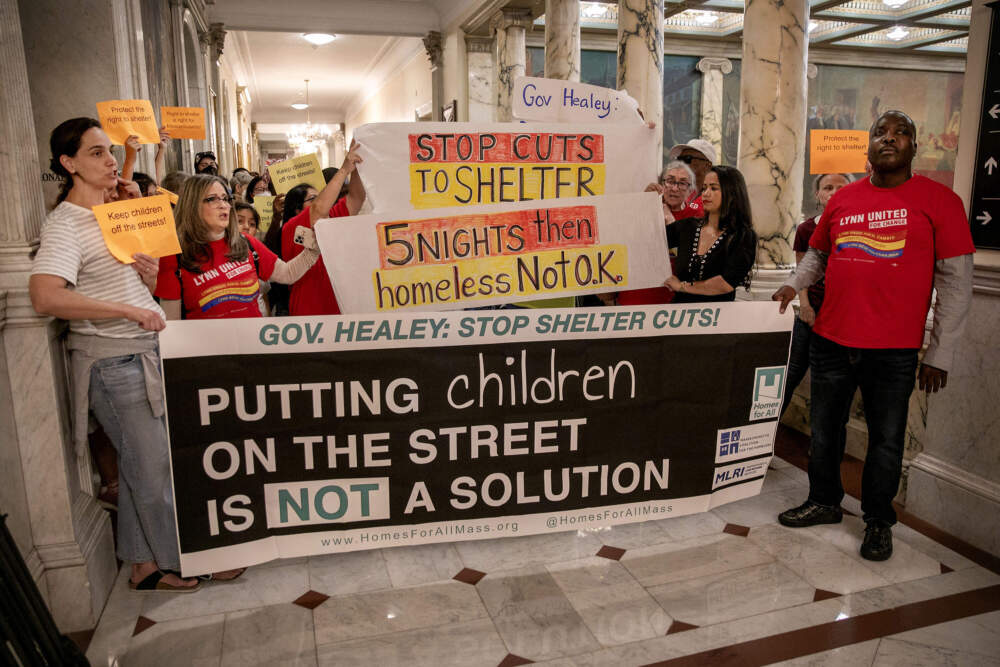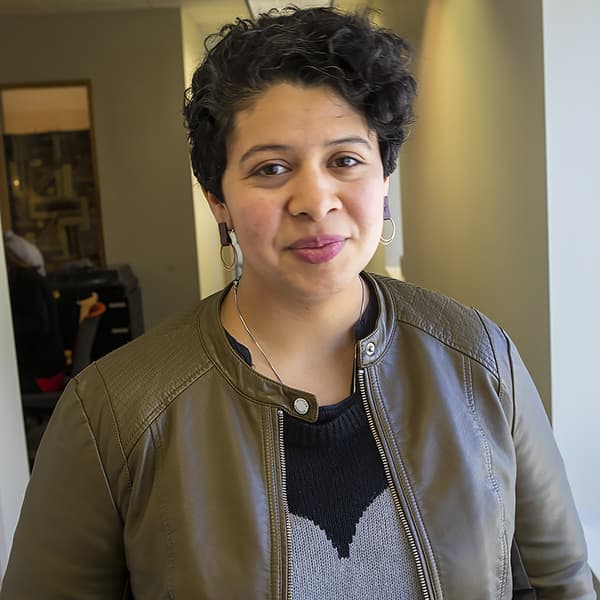Advertisement
For new migrants, the search for shelter gets harder
There was a mixture of relief and dread at the end of last week for Anold and his wife, Philesena.
They and other Haitian families across the city, suddenly faced with the state’s new five-day limit on shelter stays, were scrambling to find new options. At the Brazilian Worker Center in Allston, the couple waited to learn where they could go next.
Anold sat alert in the lobby of the worker center, his pregnant wife leaning on his shoulder. They each looked exhausted. He said he left Haiti because of the unrest there, and had heard there would be help in Boston. Instead, the couple had been sleeping in a hospital emergency room and on the street.
“I don't have siblings here. I don't have friends, I don't have anybody,” Anold said through an interpreter. He was given food stamps, he said, “But I can't use it yet because I don't have any place to buy anything and keep them fresh.”
(The migrant families agreed to speak with WBUR on the condition that only their first names be used, due to fears about their personal safety.)
Anold said he feels desperate.
“We are seeing significant confusion and concern on the ground,” said Ivan Espinoza-Madrigal, executive director of Lawyers for Civil Rights, a Boston-based civil rights group. “We have families extremely concerned that they will not have any place to sleep. Many of these families have children. They have fled harrowing conditions. And they do not have family, friends or relatives who are able to support them and take them in.”
Advocates for migrants have been protesting the state’s new five-day rule, instituted by Gov. Maura Healey as shelters in Massachusetts have filled to capacity, in part due to the influx of people arriving from other countries. Critics of the new rule say it’s cruel, along with a ban on sleeping at the airport. These stricter rules put families at risk of sleeping in T stations and outdoors.

Danielle Ferrier, chief executive of Heading Home, an agency that provides services to unhoused people, is in touch with her teams working with migrant families each day.
“On the first week of a policy change like this, you know where your end goal is,” Ferrier said in a phone interview Friday evening. It’s “to make sure none of our families and their children are on the street.” By that measure, she said, “we succeeded this week. That's the way we look at it and next week we're going to take it hour by hour and day by day, the way we did this week.”
Fewer families than expected were sent away from shelters on the Friday deadline, because workers there have the power to offer up to 30-day stay extensions. But Ferrier said families are worried about what comes next.
“We have a very strong working relationship with the [Healey] administration and we relay where we're struggling and we try to figure out what might be possible, what other tools we can bring to the table,” she said. “So we're just testing out the new policy. If we see it doesn't work, we will absolutely relay what that means to the administration the minute we feel that way or see that.”
Advertisement
By the end of Friday, 11 families exited shelters for alternative accommodations, were placed in longer-term shelters, or were offered plane tickets to go elsewhere, according to Kevin Connor, a spokesman for the Executive Office of Housing and Livable Communities.
“The remaining families have received either one-time extensions, medical extensions, or extensions due to pending enrollment into HomeBASE diversion benefit,“ he said in an email. HomeBASE is a state program that offers rent subsidies.
There are currently over 750 families waiting to get into family shelters, Ferrier said. Pregnant women as well as those with medical conditions are given priority.
“So the pressure for providers is that we need to keep the system moving so that families exit to safe, permanent housing,” she said. “In order to make sure that assuming a family needs that shelter today or tomorrow, that we have capacity and room for them to come in.”
Gerania waited alongside Anold and his wife. She said she and her family arrived in Boston by plane July 28, originally from Mexico. Since then, they have slept on the street and then in a volunteer’s house for five days. She arrived at the Brazilian Worker Center that morning.
She said she had pain in her abdomen and legs and hadn’t had a chance yet to bathe or brush her teeth.
“I thought that they were going to bring me somewhere that I could stay for a longer period of time,” she said through a translator. “But they brought me here and it's the same situation. It's not just me that this is happening to. There's other families. There's another lady with a 3-year-old child. I felt so bad for them.”
Espinoza-Madrigal, of Lawyers for Civil Rights, said the state’s new rules are creating a “chilling effect on families’ ability to access emergency housing.”
“We're talking about shelter, but we're also talking about health and education and other vital needs that families will face,” he said. “And what we're seeing are community groups on the ground rushing to support the migrants, but they don't have the bandwidth or capacity to support the number of families and children that need assistance.”
By early Friday afternoon, Anold and his wife and Gerania and her family piled into a van. Anold sent a message via WhatsApp that they were being taken to a shelter. They may get just five days there. What comes after that? He doesn’t know.
